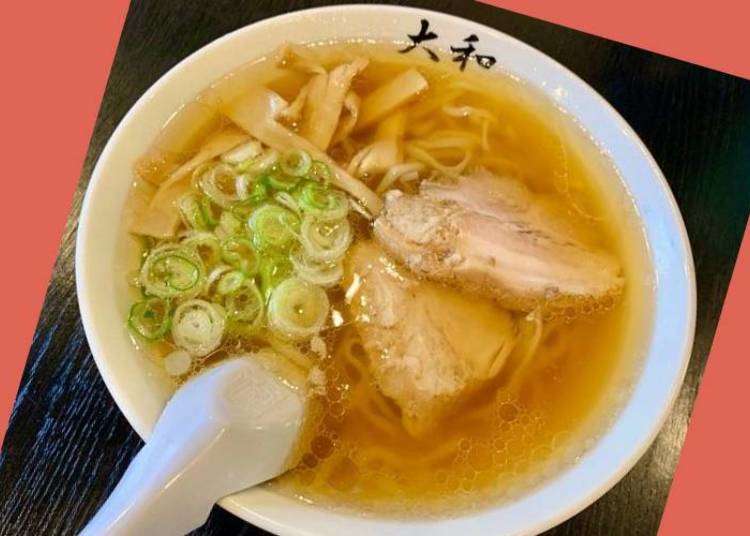
Expert-Recommended! 3 'Gotochi Ramen' Regional Noodle Shops Around Tokyo
- Written by: Miyu Shimada
There are countless types of ramen in Japan. Some popular flavors include soy sauce (shoyu), miso, salt, tonkotsu (pork bone broth), and seafood just to name a few.
Although any of the aforementioned are incredibly enticing, there are also Gotochi ramen — original ramen dishes originating in specific regions throughout Japan.
Here we have asked Mr. Hiroshi Osaki, a ramen critic and expert who’s tried many of these regional dishes, to help us choose the top three Gotochi ramen shops in the Kanto area.
Recommendations by Ramen Expert, Mr. Hiroshi Osaki!
Mr. Osaki was a ramen-lover from a young age. “Just like how rice is the staple food for most Japanese people, ramen is my staple,” shares Mr. Osaki, a ramen critic who goes through around 720 bowls of ramen per year.

Profile
Hiroshi Osaki
Ramen critic and chairman of Ramen Data Bank Co., Ltd., Osaki is also one of the founders of the Nippon Ramen Association as well as the executive chairman of the Tokyo Ramen Show. In 1959, he was born in Japan’s region of ramen, Fukushima Prefecture’s Aizu City. After working at an advertising agency, he founded Ramen Data Bank Co., Ltd. in 2005.
He is self-proclaimed as the number-one ramen eater in Japan (as of December 2021, he’s been to 13,500 ramen shops and has eaten around 27,000 bowls of ramen). Osaki has also been featured in several magazines and television programs. He’s also published books such as Muteki no Ramen Ron (The Irrefutable Ramen Theory, Kodansha's New Library of Knowledge) and Nihon Ramen Hishi (The Secret History of Ramen, published by Nihon Keizai Shimbun, Inc.).
What is Gotochi Ramen?
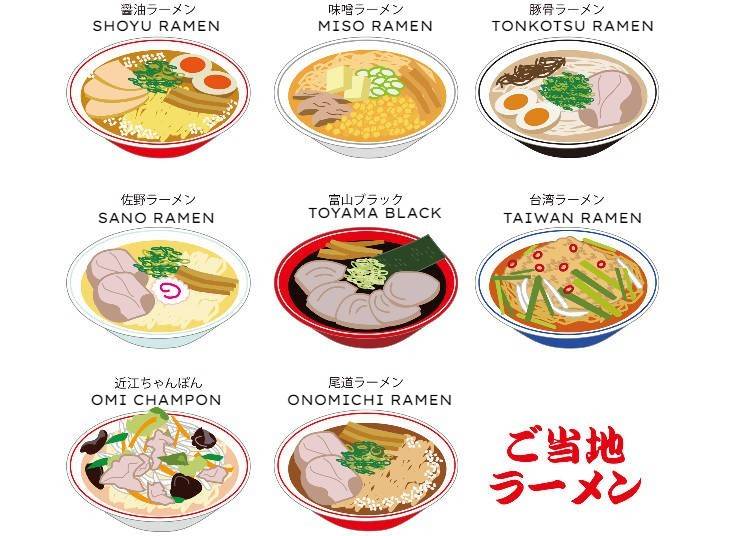
Gotochi ramen are original ramen dishes found throughout various regions in Japan. Rather than just using ingredients specific to a region, Gotochi ramen dishes use standard ingredients while implementing a region’s special cooking techniques.
“Even if the name of the dish is the same, the flavors, cooking methods, and ingredients of Japanese regional cuisine can vary drastically depending on whether it’s made in the north or south.
“This is also true with ramen. In the past, there was no internet, making it harder for information to travel like it does today. Because of this, if a particular ramen shop claimed to create an original ramen dish, it would rise in popularity and start to expand its facilities.
“Many young chefs would join the franchise to learn new cooking methods so that they could eventually open shops of their own. This caused shops with similar ramen dishes to arise in neighboring prefectures.
“With time, the ramen in these neighboring regions would become more and more unique, eventually turning into new Gotochi ramen dishes.
“However, recently, information can be acquired from anywhere at any time. Due to this, the unique characteristics and flavors of Gotochi ramen have started to fade.
“With owners passing down shops to their apprentices, younger chefs are eager to make something new rather than stick to traditional recipes. It’s quite possible that, in about 50 years from now, Gotochi ramen will be a rarity.
“For locals, getting to try new dishes and flavors of ramen might be exciting. Though, for a food traveler like me, the uniqueness of each region’s ramen will be lost. This is a foreseeable dilemma.” (Mr. Osaki)
With the change of the times, enjoying the unique characteristics of Gotochi ramen will become increasingly rare. We strongly urge trying some of these various regional flavors as soon as possible!
Find our recommendations for the three outstanding Gotochi ramen shops in the Kanto area below!
1. Kyoraku: Tokyo’s Chuka-soba Dish Made with Dried Sardines and Soy Sauce
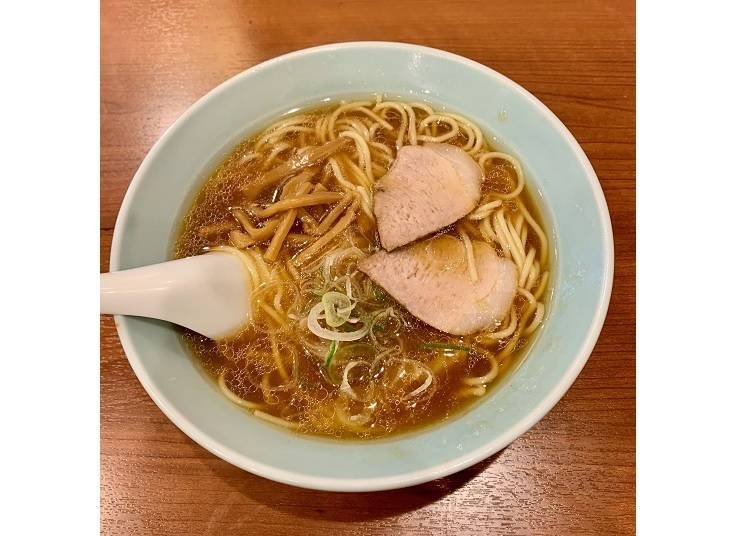
“Frankly, Gotochi ramen from Tokyo doesn’t exist. However, a dish that is common and can be recognized as representative of Tokyo is a soy sauce flavored ramen with dried sardines.
“Kyoraku, a ramen shop in Tokyo’s Ginza district with a history of over 60 years, offers the traditional flavors of sardines and soy sauce in their handed-down ramen recipe.
“Another alluring feature of this ramen shop is that although the flavors haven’t changed since its opening, the dish doesn’t seem at all outdated. The punchy taste of these Chinese noodles is beloved by men and women of all ages.
“Dried sardines are essential when making the ramen’s flavorful broth. With Kyoraku’s ramen, you can admire the professional cooking techniques in how the sardine taste is neither too strong nor too weak.
“Not just representative of Tokyo, you could say that this is a dish that represents Japan as a whole.” (Mr. Osaki)
-
Kyoraku共楽
- Address 2-10-12, Ginza, Chuo-ku, Tokyo 104-0061
- Phone Number 03-3541-7686
・Hours: Monday, Tuesday, Thursday, Friday 11 AM–5:30 PM; Saturday 11 AM–4 PM
・Closed: Wednesday, Sunday
2. Gyokusentei: Enjoy Kanagawa Prefecture’s Pacific Saury Ramen
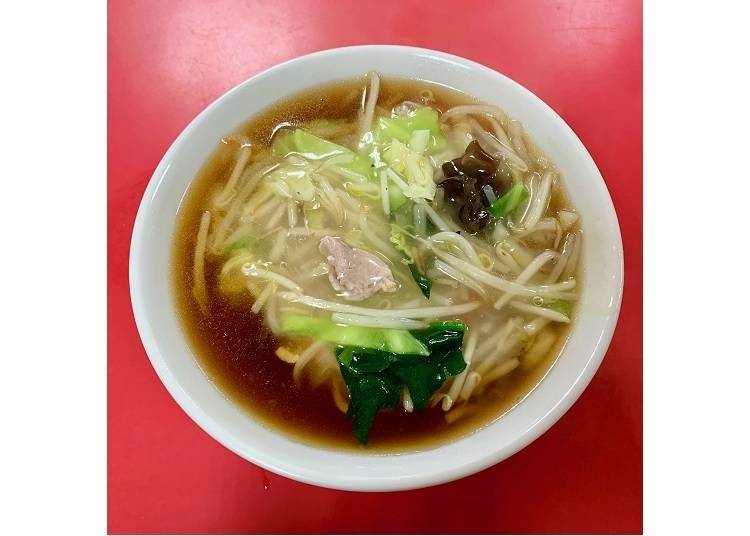
“The representative ramen dish of Kanagawa Prefecture is Pacific saury ramen (sanma ramen). There isn’t a definitive way to make this dish, so ingredients and flavors vary depending on the shop.
“Standard ingredients usually include grilled vegetables (Chinese cabbage and bean sprouts) and meat topped with a starchy sauce that’s then added to a soy sauce-based soup. This recipe is said to have been created at Gyokusentei, a ramen shop in Kanagawa Prefecture’s Yokohama City.
“Pacific saury ramen has had an unrivaled popularity since its debut at Gyokusentei 80 years ago. It was so popular, many shops imitated the flavors, causing similar dishes to spread throughout the region.
“Now, not only can you find Pacific saury ramen shops in the Kanto region, but there are also hundreds of shops throughout Japan. This dish is more of a Chinese-style ramen dish than a Japanese one.
“I had to include Gyokusentei on the list because it was the shop where Pacific saury ramen was born. I would highly recommend anyone to try it!” (Mr. Osaki)
-
Gyokusentei玉泉亭
- Address 5-127, Isezakicho, Naka-ku, Yokohama, Kanagawa 231-0045
- Phone Number 045-251-5630
・Hours: Monday, Wednesday to Sunday 11 AM–8:30 PM
・Closed: Tuesdays
3. Yamato: Serving Tochigi Prefecture’s Sano Ramen
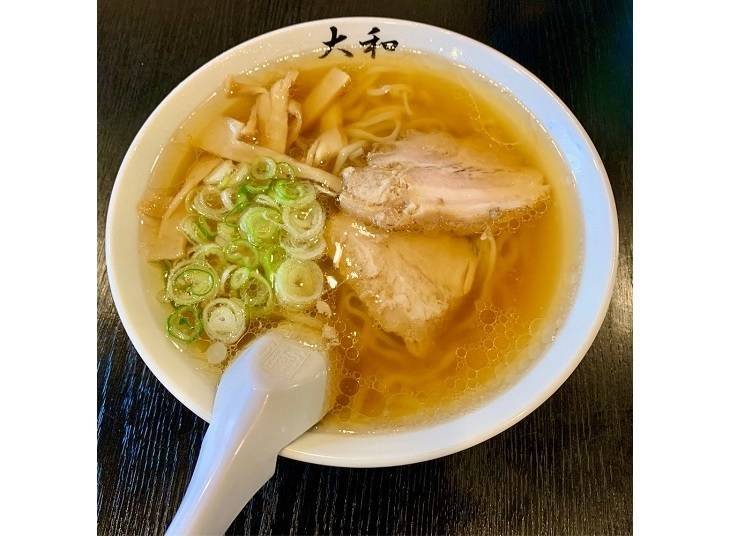
“A Gotochi ramen dish from Tochigi Prefecture is Sano ramen. Characteristics of this dish include the nearly translucent soy sauce-based soup and its noodles, which are handmade using green bamboo.
“Upon taking a look at how it’s made, you’ll find that Sano ramen is the perfect example of a Gotochi ramen dish. What’s more, when stopping by the Sano region, you’ll find Sano-style ramen shops everywhere you turn! These aren’t so easy to find in the Tokyo area.
“My recommendation, Yamato, is a fairly new ramen shop in Tochigi Prefecture. Although new, it doesn’t disappoint when it comes to keeping Sano ramen’s traditional flavors alive. Yamato’s dish is also one that keeps the reputation of Gotochi ramen intact. I wish that more people would go to the Sano region to try it.” (Mr. Osaki)
-
Sano Bamboo Handmade Ramen Yamato佐野青竹手打ちラーメン 大和
- Address 4-8, Moroyamacho, Sano, Tochigi 327-0826
- Phone Number 0283-55-4584
・Hours: Tuesday to Thursday, Friday 11 AM–2 PM, 5 PM–8 PM; Saturday to Sunday 11 AM–8 PM
・Closed: Mondays
*Sales will stop once either the soup or noodles are sold out.
Unique gotochi ramen originating in various regions throughout Japan is a must-try!
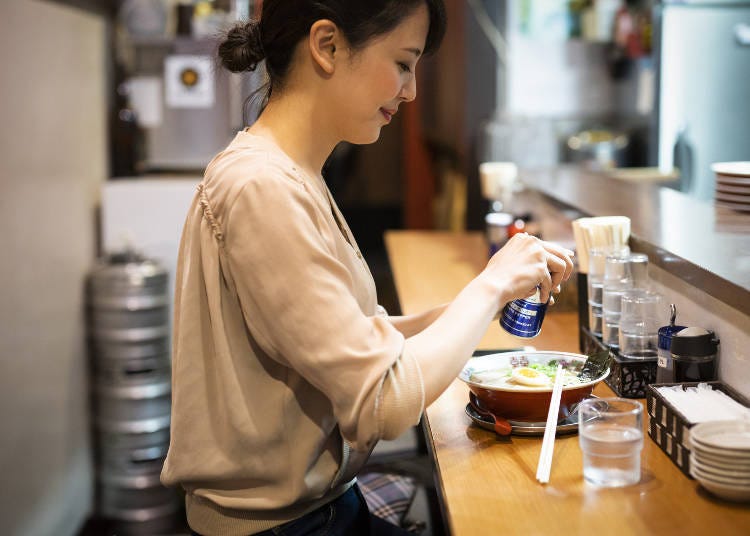
Gotochi ramen enables you to delight in the unique flavors of ramen dishes from various regions of Japan. Offering special and individual tastes, there is a reason why these dishes remained so popular.
When you have the chance to taste and compare a couple of different kinds, you just might find yourself getting swept into the deep culture of Gotochi ramen.
Each shop introduced in this article comes highly recommended by a ramen professional with a lot of experience. Be prepared to wait in line when making a trip!
*The information in this article is from January 2022, with prices and shop hours updated in May 2024.
Miyu is a travel writer and tour conductor with over a decade of experience in developing educational content for working individuals. She has a passion for exploring new cultures and has visited more than 150 cities in around 50 countries. Her goal is to sample great food, experience nature, enjoy historical sites, and bathe in hot springs around the world. Miyu left her corporate job to pursue her passion for travel and now spends over 100 days a year abroad while working as a writer. She promotes the joy of travel, the beauty of Japan, and the diverse cultures of the world by traveling to different parts of Japan and collaborating with inbound tour operators and fellow travel writers.
*Prices and options mentioned are subject to change.
*Unless stated otherwise, all prices include tax.
Popular Tours & Activitiess
-
Ad

What Makes Japanese Yakiniku So Darn Good? Guide to Cuts, Heat, and Wagyu Know-How
-

Farewell, Heavy Suitcases! Keisei Ueno’s New Service Makes Your Last Day in Tokyo Totally Hands-Free
by: Guest Contributor
-

Top 3 OSHI MAPs for the Best Matcha and Sweets in Tokyo
by: Guest Contributor
-

To the Holy Land of Kawaii! Odakyu Tama Center Station Is Becoming a Dreamy Sanrio Wonderland
by: Guest Contributor
-

A New Tokyo Landmark Is Coming in 2026, and It's Built for Modern Travelers
by: Guest Contributor
-

Where to Buy a Japanese Kitchen Knife? Why Travelers Choose MUSASHI JAPAN's 14 Stores in Tokyo, Kyoto, and Nara
by: Guest Contributor
-

6 Fun Things to Do at Tokyo's World-Famous Tsukiji Outer Market!
-

Ramen Guru Eats 350 Bowls of Ramen a Year - Tells Us Where to Get the Best Ramen in Akihabara
-

Japan's Bath Culture: Tips You Should Know!
-

The Recipe for Ichiran Ramen's Global Success
-

Ramen in Tokyo
-

Playing With Fire: Tasting Tokyo's Super-Spicy 'Arctic Ramen' at Ramen Shop Moko Tanmen Nakamoto
- #best ramen tokyo
- #what to buy in ameyoko
- #what to bring to japan
- #new years in tokyo
- #best izakaya shinjuku
- #things to do tokyo
- #japanese nail trends
- #what to do in odaiba
- #onsen tattoo friendly tokyo
- #daiso
- #best sushi ginza
- #japanese convenience store snacks
- #best yakiniku shibuya
- #japanese fashion culture
- #best japanese soft drinks























